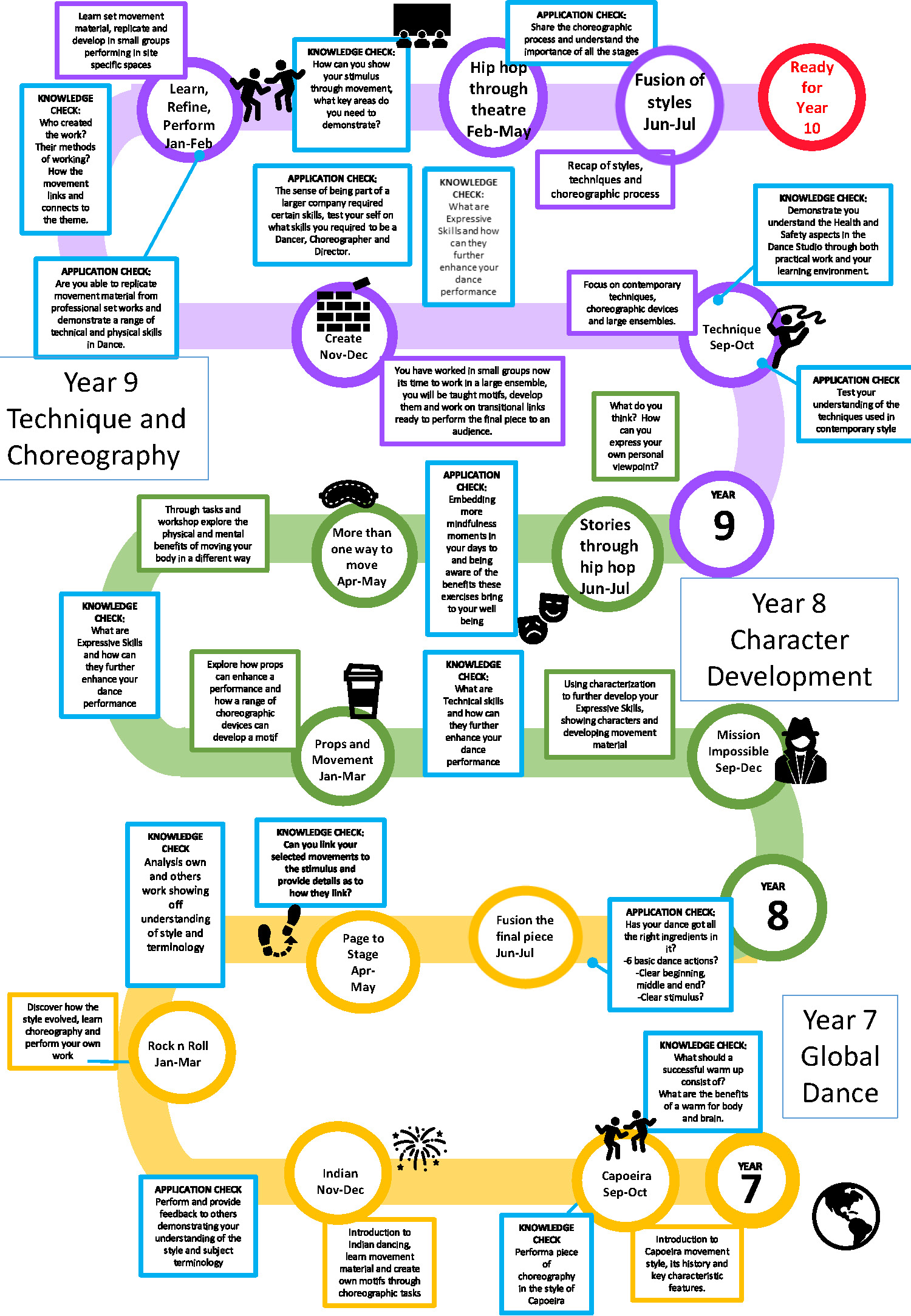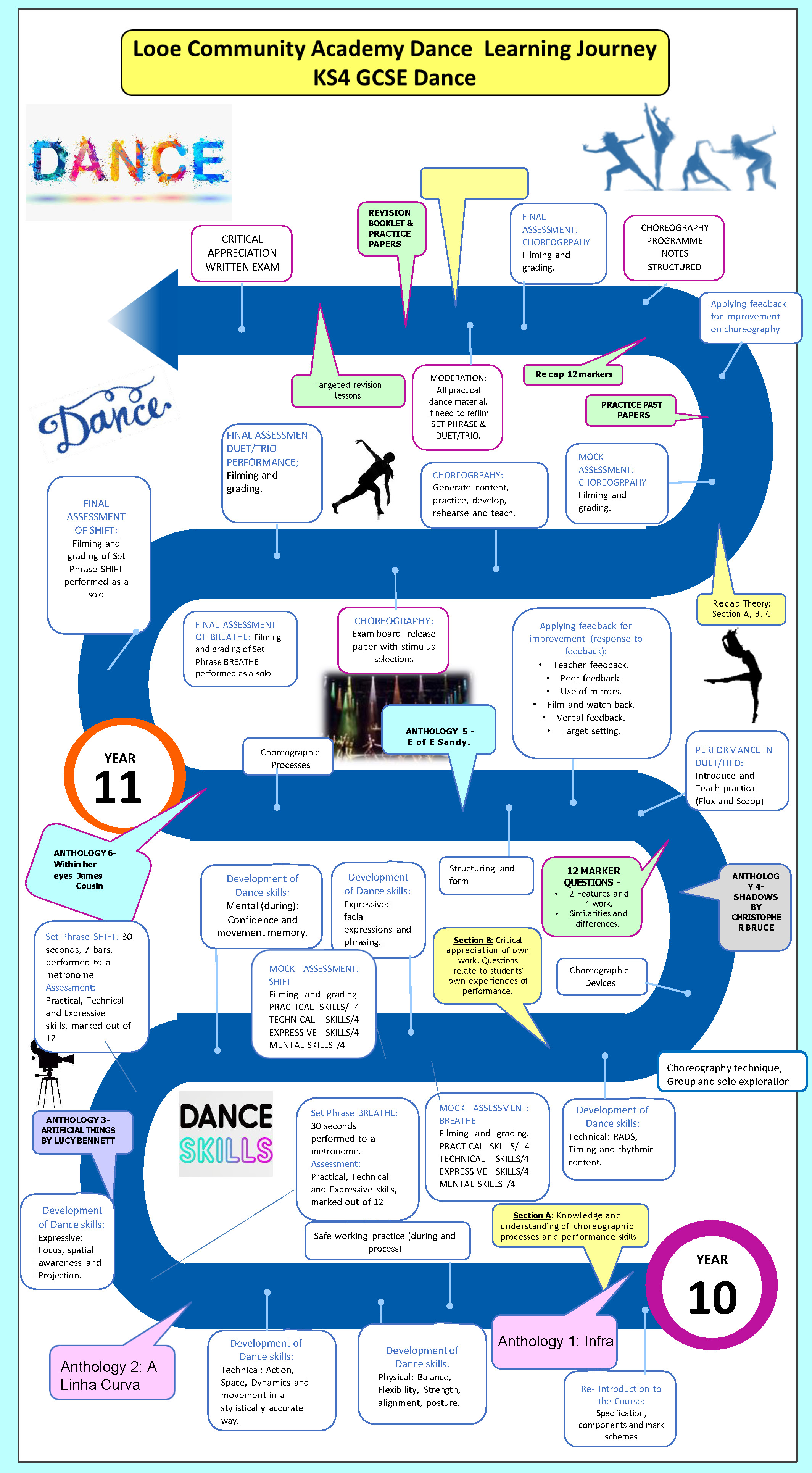Dance
Dance is the hidden language of the soul
– Martha Graham
Dance Curriculum Intent Statement
At Looe Community Academy, our Dance curriculum is designed to inspire creativity and empower every learner to express themselves with confidence through movement. We believe dance is both an art form and an academic discipline; therefore, our curriculum deliberately connects technique, performance, and appreciation. This enables students to understand not only how to move, but why movement matters.
Central to our curriculum are the big ideas of Create, Perform, and Appreciate. These concepts underpin every unit of study and provide a clear framework through which students explore how movement communicates ideas, emotions, and cultural identity. Through these lenses, learners develop technical precision, expressive qualities, and the ability to analyse and interpret both their own work and professional repertoire.
We aim to provide high challenge with low threat, fostering a supportive environment where students feel safe to take creative risks and develop their own choreographic voice. Students encounter a wide range of styles—from the cultural roots of Capoeira and the precision of Indian dance to contemporary and hip-hop fusion—encouraging them to question, interpret, and respond with originality and confidence.
Our curriculum is deliberately spiralled, revisiting and extending key concepts at increasing levels of complexity:
-
Year 7: Students establish strong foundations in technique and performance through accessible styles such as Capoeira and Indian dance. They are introduced to basic choreographic devices and begin to appreciate dance within its cultural and historical contexts.
-
Year 8: Challenge increases as students apply choreographic tools to create original work, explore characterisation, and analyse professional repertoire. Performance confidence grows, and students begin to articulate creative intent using subject-specific language.
-
Year 9: Students deepen technical skills through contemporary dance and the study of professional works. They explore more advanced choreographic structures, refine expressive qualities, and engage in extended reflection using accurate dance terminology.
-
Key Stage 4: Students work at an advanced level, mastering physical, technical, and expressive skills. They study set works in depth, analyse choreographers’ intent, and create sophisticated choreography using complex devices and structures. Written analysis and evaluative skills are embedded throughout to prepare students for GCSE assessment.
This carefully planned progression ensures that knowledge and skills are revisited, reinforced, and extended, moving from guided exploration to increasingly independent and creative projects. As a result, students develop confidence, curiosity, and academic rigour, preparing them for further study and life beyond the studio.
To further enrich learning, we offer regular dance clubs every Tuesday, Wednesday, and Thursday lunchtime, providing consistent opportunities for skill development and enrichment. A homework system is in place for all year groups to support retention, reflection, and dance literacy. We also provide increased performance opportunities, allowing students to apply their learning in authentic contexts.
Lessons now have more structured starts, with increased student leadership and ownership, particularly during warm-ups. There is a strong focus on dance literacy and subject-specific language throughout the curriculum, ensuring students can confidently articulate ideas, analyse work, and evaluate performance with precision.
Curriculum Pathways


Focused Curriculum Contextual Routines
- Turn and Talk
- Say it again but better
- Mini White Boards
- Cold Calling
- Modelling
- Choral response
Additional Opportunities Beyond the Classroom
- Live theatre and professional dance performances
- Dance videography and photography
- Workshops led by visiting professional dancers and choreographers
- Participation in local dance festivals and showcases
- Outreach workshops with community dance organisations
- Theatre technical tours focusing on lighting, staging, and production
- School performance events
- Lunchtime and after-school dance clubs and rehearsal opportunities
- Choreography and performance projects for community or charity events


